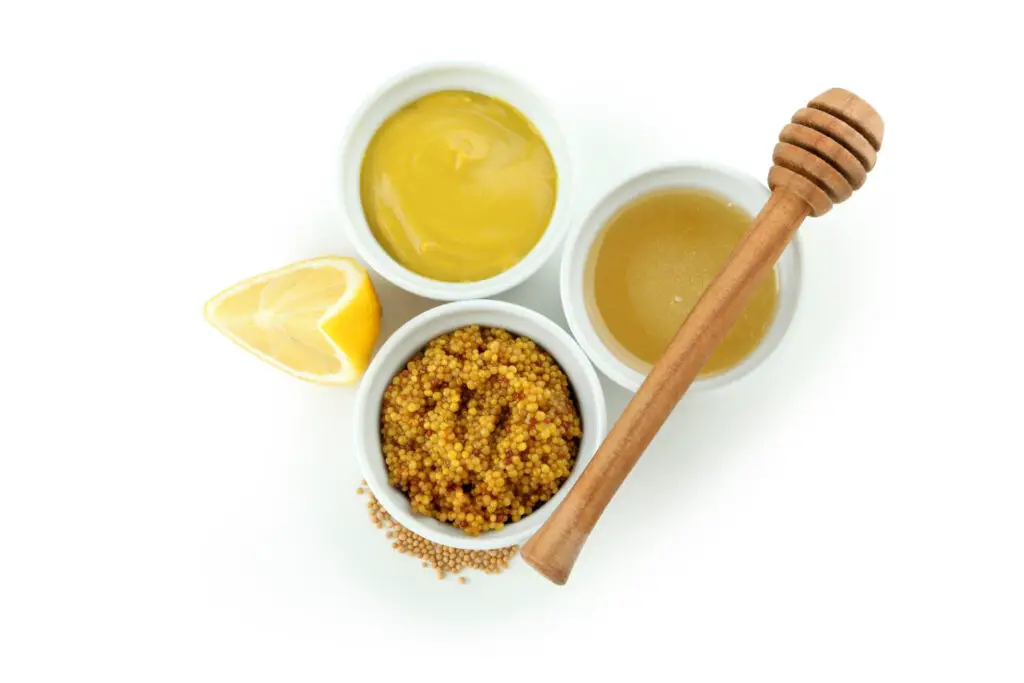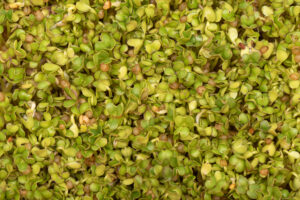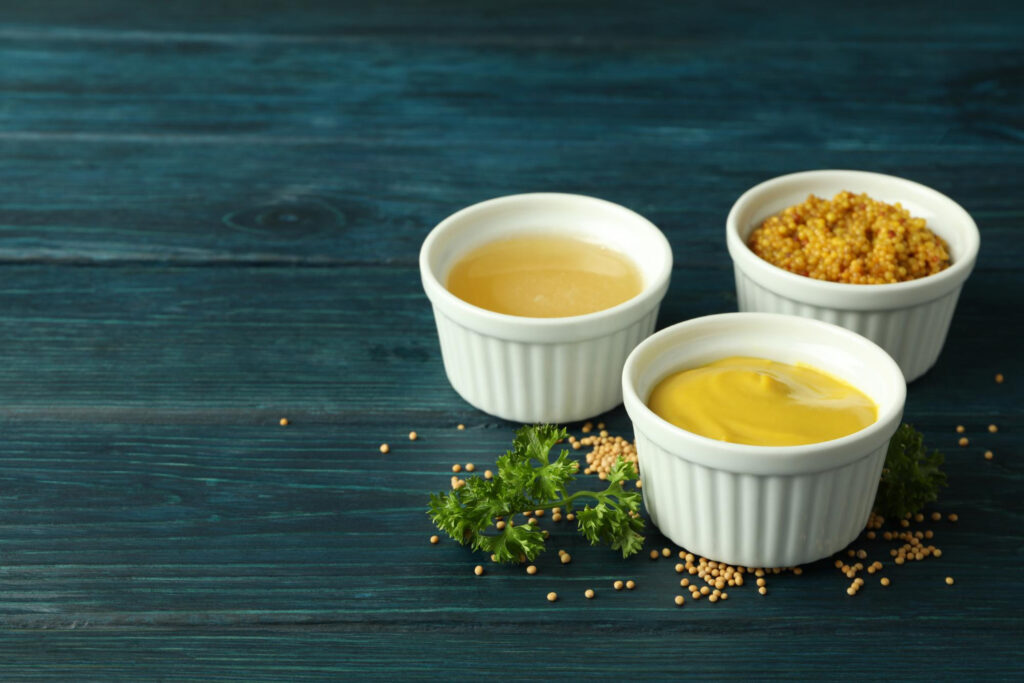This post contains affiliate links. When you buy through our links, we may earn a commission.
 Mustard oil is a type of vegetable oil derived from the seeds of a mustard plant.
Mustard oil is a type of vegetable oil derived from the seeds of a mustard plant.
It is used for its cosmetic, therapeutic, and many health benefits. Learn more about it in this information-rich article on What to Cook with Mustard Oil.
Mustard oil is made from the seeds of mustard plants and is often used as a base for salad dressings and cold dishes. The oil has a distinct aroma and a peppery, pungent flavor, making it a perfect ingredient for curries, stir-fries, and other savory dishes.
Mustard oil, or Sarson ka tel, is a popular ingredient in Indian cuisine. It is used for deep frying and sautéing vegetables, particularly potatoes and brinjals, and in spicing up salad dressings.
Mustard oil has many health benefits but has a strong aromatic flavor and scent that may not be to everyone’s liking. For this reason, some wonder if it makes sense to cook with mustard oil or if other options would provide the same health benefits without the taste.
Is it good to use mustard oil for cooking?
Mustard oil is often used in India, Russia, Pakistan, and China. You usually find it in stores catering to South Asian or Southeast Asian cuisine. It has a distinctive taste that will make your food more flavourful than ever.

So, if you’re planning on cooking Indian or Chinese food at home (or any Asian cuisine), then mustard oil would be a good addition. People who have problems with digestion may want to cook with mustard oil as it helps ease upset stomachs.
It’s not uncommon for people to use this oil as a soother when they’re feeling under the weather.
However, despite these positive health benefits, many are still wary of cooking with this oil because they fear the spicy flavor.
What is mustard oil good for?
Antioxidant properties
One of the most well-known health benefits of mustard oil is its ability to improve heart health. Mustard oil is a good source of monounsaturated fatty acids, which have been shown to lower cholesterol levels and reduce the risk of heart disease.
The ratio of omega 3 and 6 fatty acids in mustard oil is ideal. Additionally, the antioxidants present can help protect the heart from further damage.
The oil has also been shown to boost cognitive function. The antioxidant properties present in mustard oil may be responsible for this effect.
Anti-inflammatory properties
Mustard oil is also known for its anti-inflammatory properties. The fatty acids present can help to reduce inflammation throughout the body.
Additionally, the antioxidants in mustard oil can help to protect the body from damage caused by inflammation.
Antimicrobial properties
 Mustards, both yellow and brown, are commonly used in the production of condiments, salad dressings, pickles, sauces, processed meats, and egg substitutes. They are commercially available as whole mustard seeds, ground or cracked seeds, meals, or flour.
Mustards, both yellow and brown, are commonly used in the production of condiments, salad dressings, pickles, sauces, processed meats, and egg substitutes. They are commercially available as whole mustard seeds, ground or cracked seeds, meals, or flour.
While mustard is most commonly used as a spice or for its functional benefits, it can protect raw and processed foods against pathogenic and spoilage microbes.
All mustard varieties contain glucosinolates, including yellow mustard seeds, white Sinapis alba, and brown/oriental Brassica juncea mustard.
These glucosinolates, as well as their isothiocyanate (ITC) breakdown products, are responsible for mustard’s inherent antimicrobial activity and heat and pungency.
Cosmetic benefits
Mustard oil has a wide range of topical applications and is useful in various forms. It is a natural sunscreen due to its intrinsic vitamin E content. It also has anti-inflammatory, antifungal, and antibacterial properties. These properties assist in preventing acne, blackheads, flushing toxins, removing blemishes, and alleviating other skin problems.
However, people with oily or sensitive skin are advised to avoid using it. Mustard oil prevents hair loss by locking in moisture and revitalizing the scalp with hair-friendly nutrients. It fights dandruff due to its antibacterial effects.
You can treat chapped lips with mustard oil as it will lighten and hydrate them.
Therapeutic benefits
It’s been proven that a body massage with mustard oil improves blood flow and reduces pigmentation. Regular massages can assist in relieving painful joints and muscles.
Patients with arthritis benefit from a massage with mustard oil because it contains Omega-3 fatty acids, which help ease stiffness and body pain caused by arthritis.

There are three main points to consider when deciding whether or not you should boil mustard oil before cooking food. These include the safety of consuming raw mustard oil, the flavor of the oil, and the nutrient content.
Some people believe that consuming raw mustard oil can be dangerous. Mustard oil contains a compound called erucic acid, which can be harmful if large amounts of it are ingested. However, boiling the oil removes this compound, making it safe to consume.
Others believe that boiling mustard oil ruins the flavor. Mustard oil has a strong, pungent taste that some people enjoy. Boiling the oil mellows the flavor, making it less intense. Mustard oil is a good source of vitamins and minerals, including vitamin E and magnesium. However, boiling the oil may reduce the amount of these nutrients.
So, should mustard oil be boiled before cooking? It depends on your personal preferences and beliefs. If you are concerned about the safety of consuming raw mustard oil, boiling it before use is a good idea. Cooking the oil may be the best option if you prefer a milder flavor.
Suppose you are using mustard oil for deep frying. In that case, you will also find that adding a pinch of turmeric to whatever you’re cooking will help eliminate the strong aftertaste while keeping the nutritional value at an optimal level.
However, if you want to maximize the nutrient content of the oil, it is best to use it raw. You can also try the edible mustard oil called Yandilla.
Can we cook vegetables in mustard oil?
In many regions of the world, including India, Bangladesh, and Pakistan, mustard oil is commonly used for sautéing and stir-frying vegetables. When roasting vegetables, you can substitute mustard oil for olive oil.
Some easy vegetable recipes with mustard that you can try include Mustard oil-dressed cucumber salad, Sabzi Indian Mixed Vegetable Curry, and Green Beans with Mustard Oil and Black Mustard Seeds.
If you are a fan of Indian food and not afraid to attempt a new recipe, then you can try the more intense mustard oil dishes. I assure you that you will be in for a food fiesta. The Dhaba-style egg curry, Palong Shaak, Chicken Tikka Kebabs, and Fish fry are among the most cooked mustard oil recipes enjoyed by all.
Conclusion
If you have been wondering what to cook with mustard oil, we hope you now have the answers. Try the different Indian food recipes or venture into Chinese and Pakistani cuisines that also use mustard oil for cooking. Use it for deep-fat frying, sautéing vegetables, curries, stir-fries, and more.
You can boil mustard oil before cooking to remove some of the pungent, peppery flavors. With its rich nutritional content, you will also protect your heart, reduce inflammation and increase cognitive function.
Also, try mustard oil for strengthening your hair or removing dandruff, as sunscreen, and for massages to ease body pain and muscle aches.
Frequently Asked Questions (FAQ)
Is Mustard Oil better than Olive Oil?
Because of its optimum fatty acid ratio, mustard oil is healthier than olive oil by the majority of researchers. It contains the proper omega-3 and omega-6 amounts, making it a superfood for optimal heart health. However, this perfect percentage is missing in olive oil, plus the price is exorbitant.
What are the side effects of Mustard Oil?
Because mustard oil contains such high levels of erucic acid, it can pose a significant health risk to us. High doses of mustard oil have been linked to a few illnesses when not heated.
Does Mustard Oil make you fat?
Mustard oil doesn't make you gain weight. Although adding mustard to your weight loss regimen is unlikely to result in a 20-pound weight loss, it may give your body an extra fat-burning boost. Several studies have found that some mustard spices, such as capsaicin, can assist in weight loss.
Can I apply Mustard Oil on face?
Mustard oil works wonderfully on dark spots, tan, and pigmentation, ultimately reducing them. To apply the oil to your skin, mix it with your regular face mask. Allow 15 minutes for it to dry after using it. Then, with cold water, rinse it off. However, mustard oil should be avoided by persons with sensitive skin.
Is Mustard Oil good for frying?
The smoke point of pure mustard oil is around 480°F (250°C), which puts it on par with other fats like butter. It's a popular choice for high-heat culinary methods, including frying, roasting, baking, and grilling.
Mustard photo created by atlascompany – www.freepik.com
Mustard photo created by atlascompany – www.freepik.com
